50+ AI in Customer Service Statistics 2024
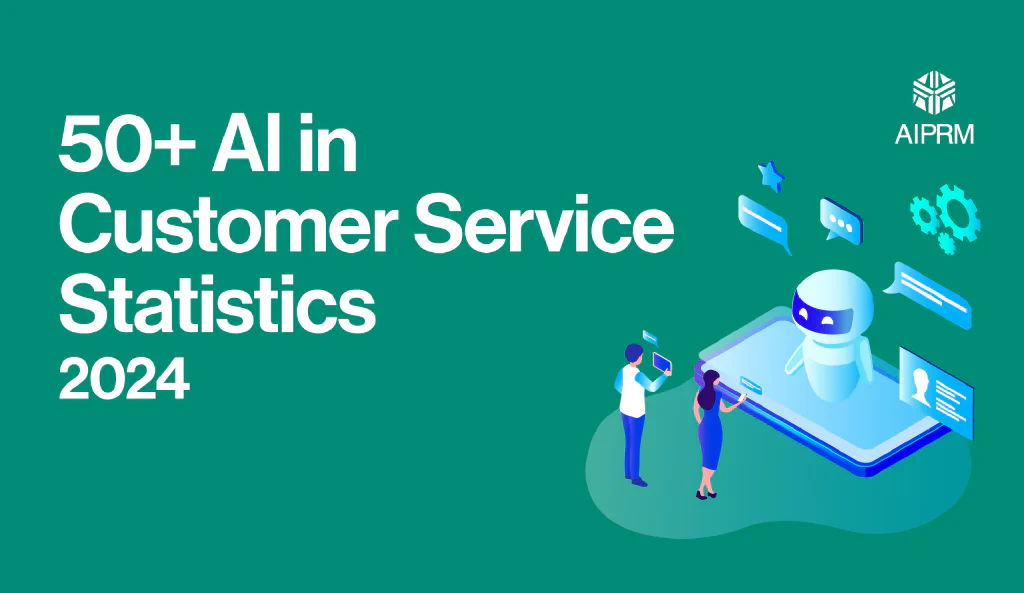
Almost three in four (73%) customers say that they will switch to a competitor if they have multiple bad experiences with a business, indicating how a brand’s customer service department can play a considerable role in customer retention.
As companies look to improve their customer service, many are turning to AI to streamline processes and maintain high standards. This report covers everything you need to know about the role of AI in customer service, including the top AI in customer service stats, and details on the rate of AI adoption within the customer service space.
Top 10 AI in customer service statistics #
- The call center AI market is projected to value $6 billion by 2032.
- Customers are increasingly concerned about the use of their time, with a 63% increase in the expected speed of response, and a 57% increase in the expected speed of resolution.
- C-level executives express greater levels of optimism than customer service agents that AI can enhance customer service teams’ success (61% vs. 45%).
- US businesses are the most interested in customer experience (CX) automation, with over a quarter (27%) stating this is extremely important, compared to just 16% of Canadian businesses saying the same, and only 8% of UK companies.
- More businesses are using chatbots (74%) than conversational AI (29%).
- Chatbots are the most valuable asset provided by AI in CX centers, with nearly nine-tenths (89%) stating that this is their most useful application.
- Half of support teams’ agents state that AI’s biggest benefit is its ability to offer 24/7 availability for customers.
- Data quality or availability is the biggest obstacle (77%) to efficient AI implementation.
- Over three-quarters (78%) of customer service agents agree that customers are open to being served by AI.
- Nearly four-fifths (78%) of CX leaders believe that human customer service agents are irreplaceable.
AI in the customer service market #
As AI extends across all avenues of life, it is finding its place in the customer service sector. Businesses are turning to generative AI to streamline processes by providing immediate responses to frequently asked questions, as well as facilitating conversations which can then be directed to a human agent.
Call center AI market #
Call centers are utilizing AI language models based on machine learning in order to replicate traditional human call center agent interactions.
Through the use of chatbots, virtual assistants, and predictive analytics, AI is able to initiate intelligent routing – directing customers to the right human agent in a timely manner.
A breakdown of the current and predicted value of the call center AI market (2022-2032) #
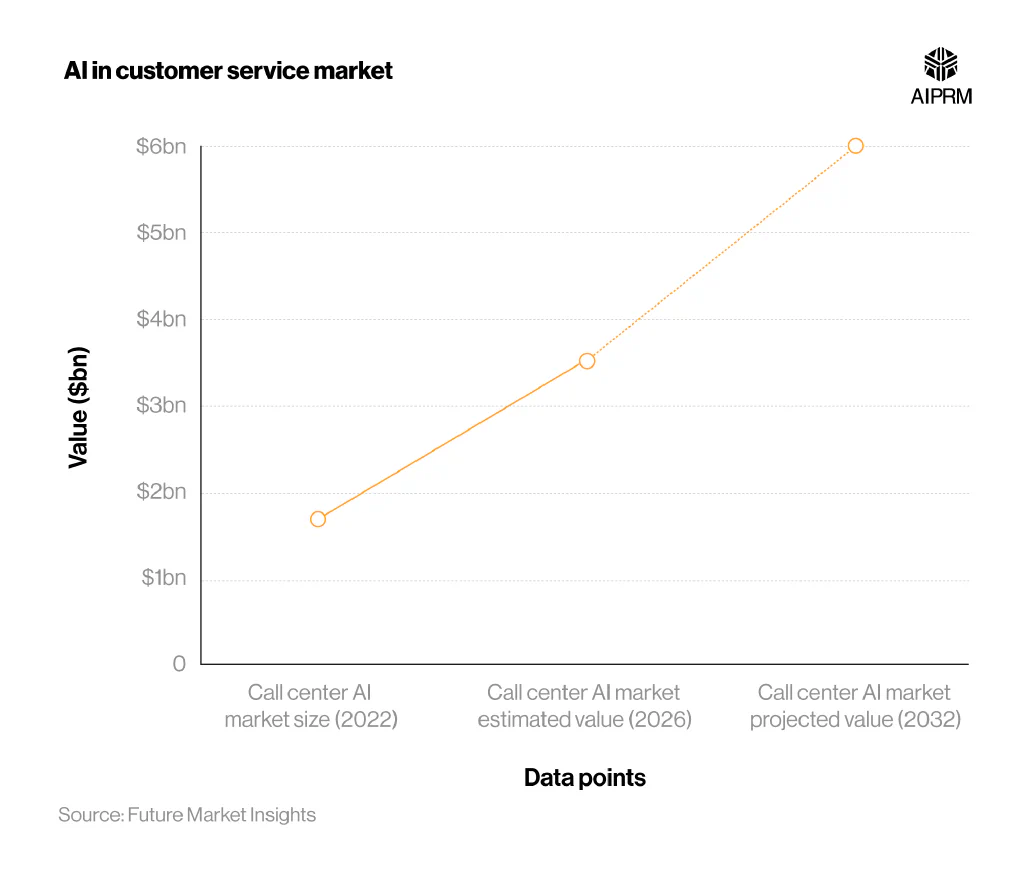
In 2022 the call center AI market was valued at $1.7 billion.
This sector is expected to grow by 111.77% to $3.6 billion in 2026, with a further projected value of $6 billion by 2032. This represents a 66.67% increase from 2026 estimations, and a 252.94% increase from 2022 valuations.
Conversational AI market #
Conversational AI is a learning model which trains software to understand and respond to both text-based and voice-based human interactions.
A breakdown of the current and forecasted spending on conversational AI and virtual assistance in contact centers (Millions of U.S. Dollars) #
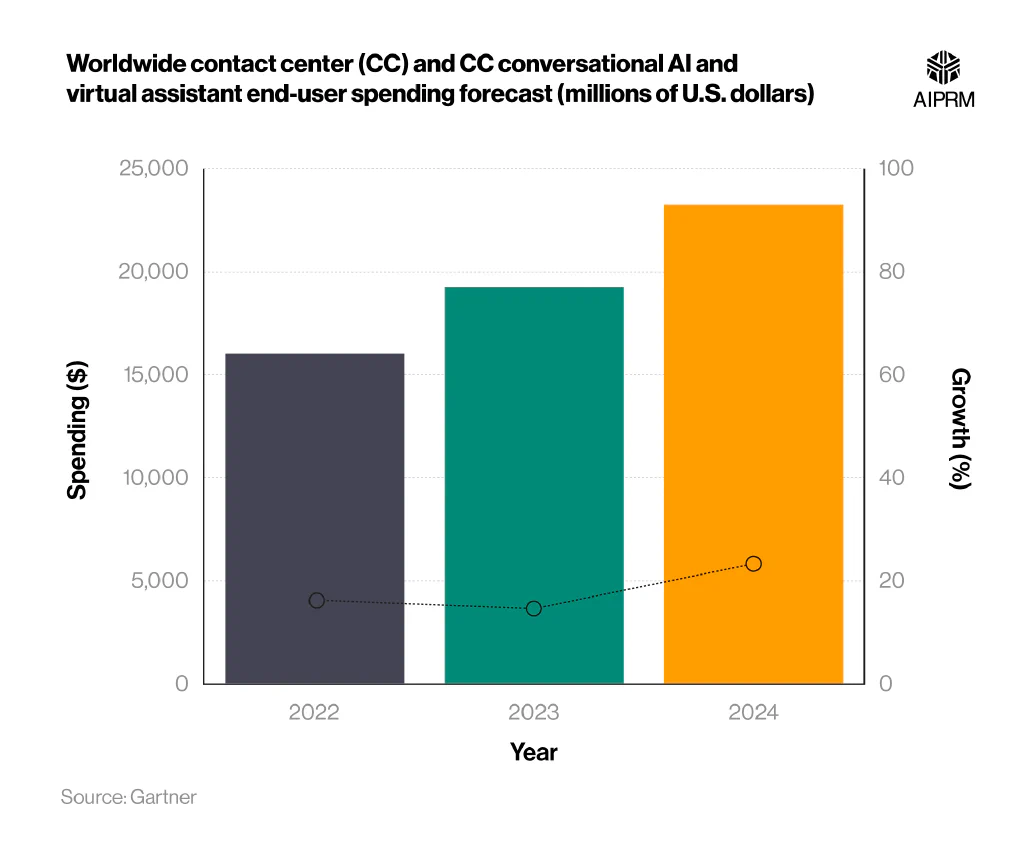
In 2022, contact centers were spending more than $16 billion ($16,077,000,000) on conversational AI technology. This is predicted to grow by nearly a quarter (24%) to $23.17 billion in 2024.
Customer service trends 2024 #
In order to understand how AI is being used in customer service, it is first important to analyze how customers’ expectations of customer service are changing.
A breakdown of the areas in which service agents say they are seeing the most increased customer expectations #
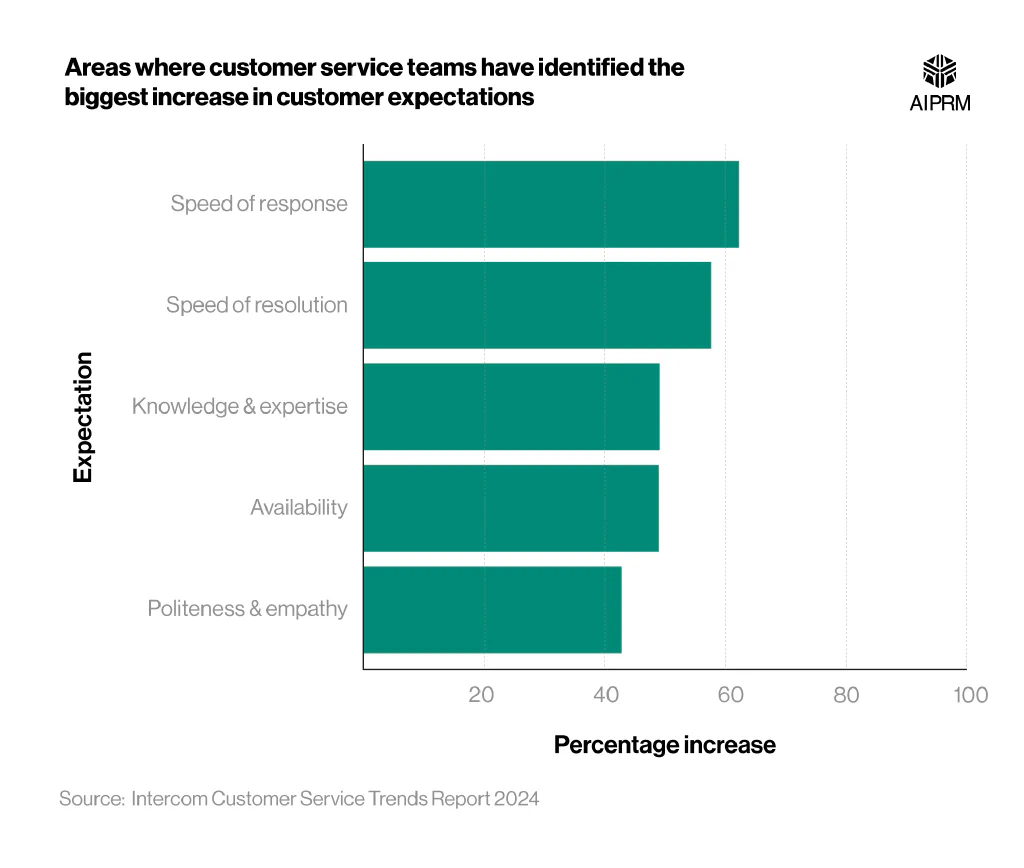
The Intercom Customer Service Trends Report 2024 found that customers’ expectations on the speed of initial response increased by almost two-thirds (63%) between 2023 and 2024. Similarly, expectations on the speed at which their issue is resolved have increased by almost three-fifths (57%). AI can substantially speed up processes, offering businesses the ability to meet these rising expectations.
Consumer expectations around knowledge and expertise, and availability, areas in which AI can assist, have also risen (+49% each), yet customers also report increased expectations for politeness and empathy (+43%), uniquely human traits.
Customer service trends #
AI in customer service statistics show that there is a clear optimism gap between C-level executives and support agents on the opportunities provided by AI.
A breakdown of the expectations of increased success through AI use, from C-level executives and support agents #
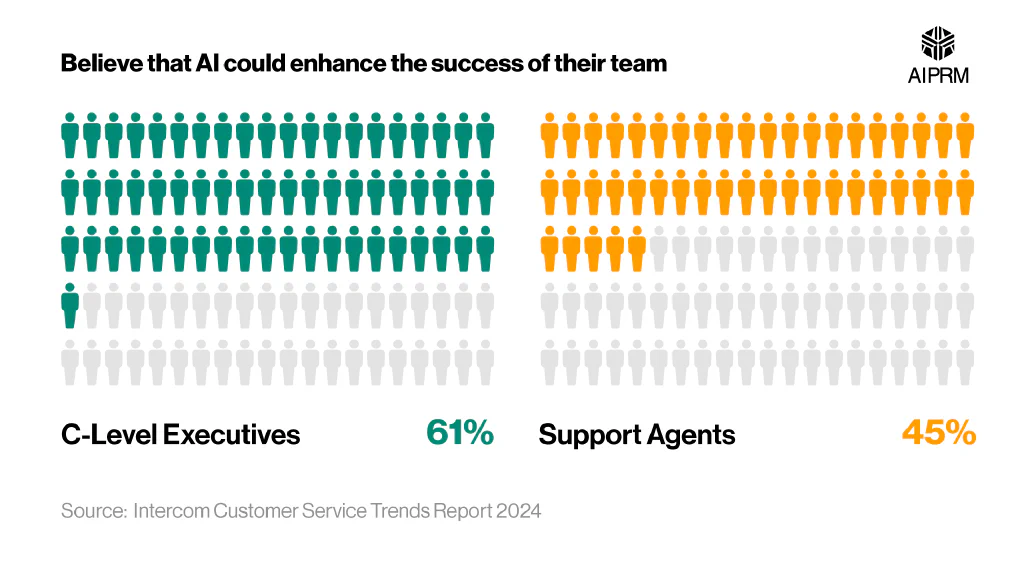
Around three-fifths (61%) of C-level executives believe that AI can enhance their team’s success. This indicates a 16-point optimism gap, as just 45% of support agents share this sentiment.
This may be because support agents are only considering the influence of chatbots - a so-called digital colleague - while there is a much greater scope for AI that can simplify their workloads and enhance their productivity.
Trends in AI adoption in customer service #
Contact center and IT leaders in the US are more likely to consider AI automation a priority than their counterparts in the UK and Canada.
A breakdown of attitudes on the importance of adopting or increasing AI automation in contact centers across the US, UK, and Canada #
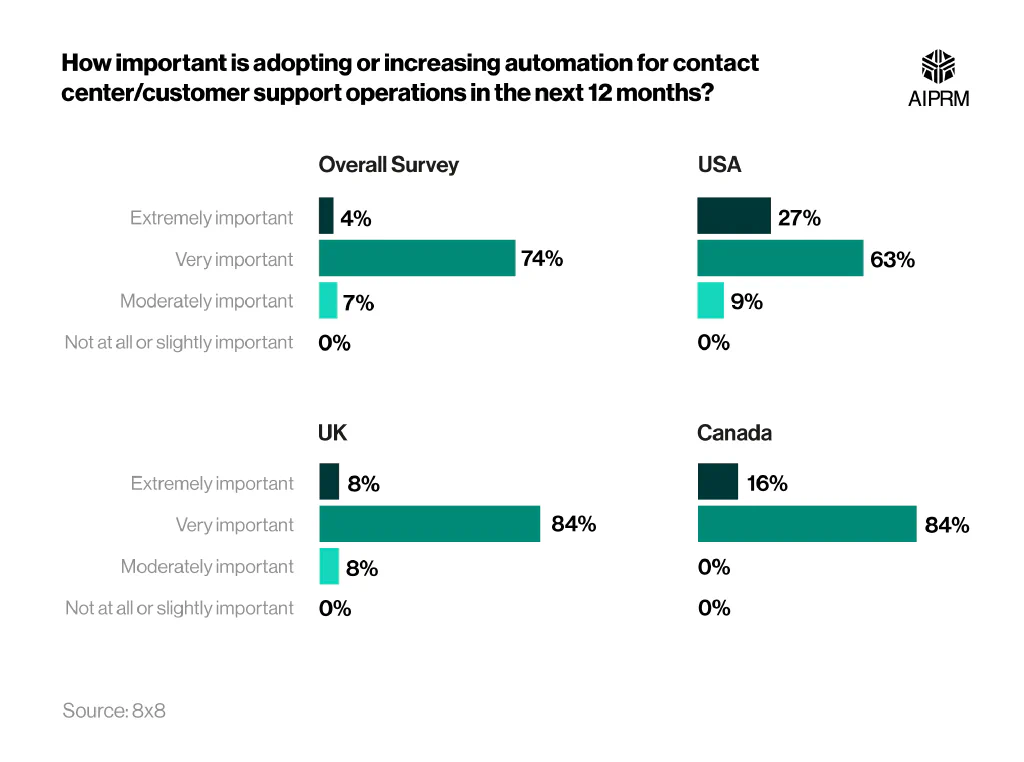
While more than a quarter (27%) of US leaders have dubbed automation ‘extremely important’, this figure is just 16% in Canada, and as low as 8% in the UK.
The proportion of customer experience leaders in the UK and Canada that believe AI adoption is ‘very important’ are the same, at over four-fifths (84%).
No leaders reject the importance of customer support automation (0%).
Trends in conversational AI adoption in customer service #
AI in customer service statistics show that a far greater number of companies are implementing chatbots in their customer service operations (74%), than those harnessing the power of conversational AI (29%).
A breakdown of companies’ experiences with conversational AI capabilities for contact center/customer support operations #
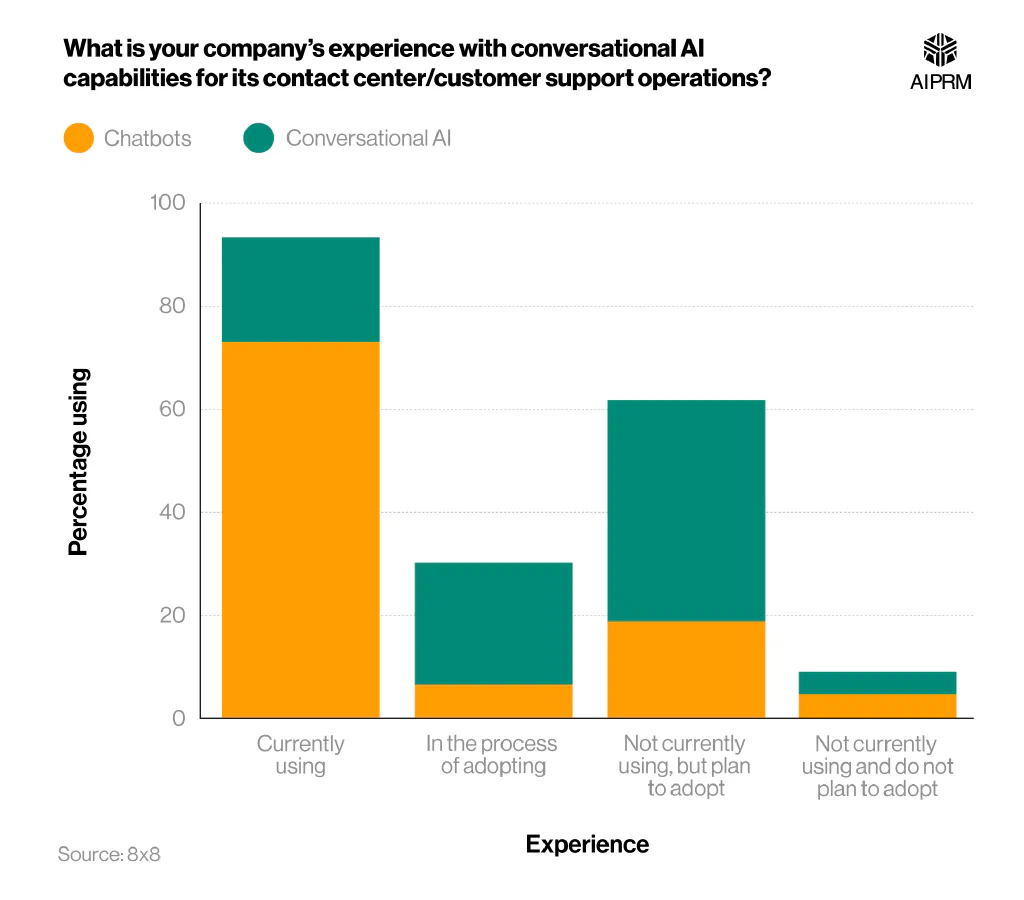
In turn, there is a greater proportion of companies either in the process of adopting, or planning to adopt, conversational AI, 23% and 44% respectively.
The proportion of companies who are neither currently using nor intending to implement AI is the same across both chatbots and conversational AI (4%).
Statistics on the use of AI in customer service #
According to the Intercom Customer Service Trends Report, nearly half (45%) of support teams are already using AI.
Most common ways to use AI in customer service #
AI’s biggest presence in customer service is through a chatbot interface, where human agent interactions are simulated to provide customers with simple answers. Nearly nine in 10 (89%) contact centers report using AI for these digital chatbots.
A breakdown of the most used AI-based capabilities in contact centers (considered “very” or “extremely” valuable) #
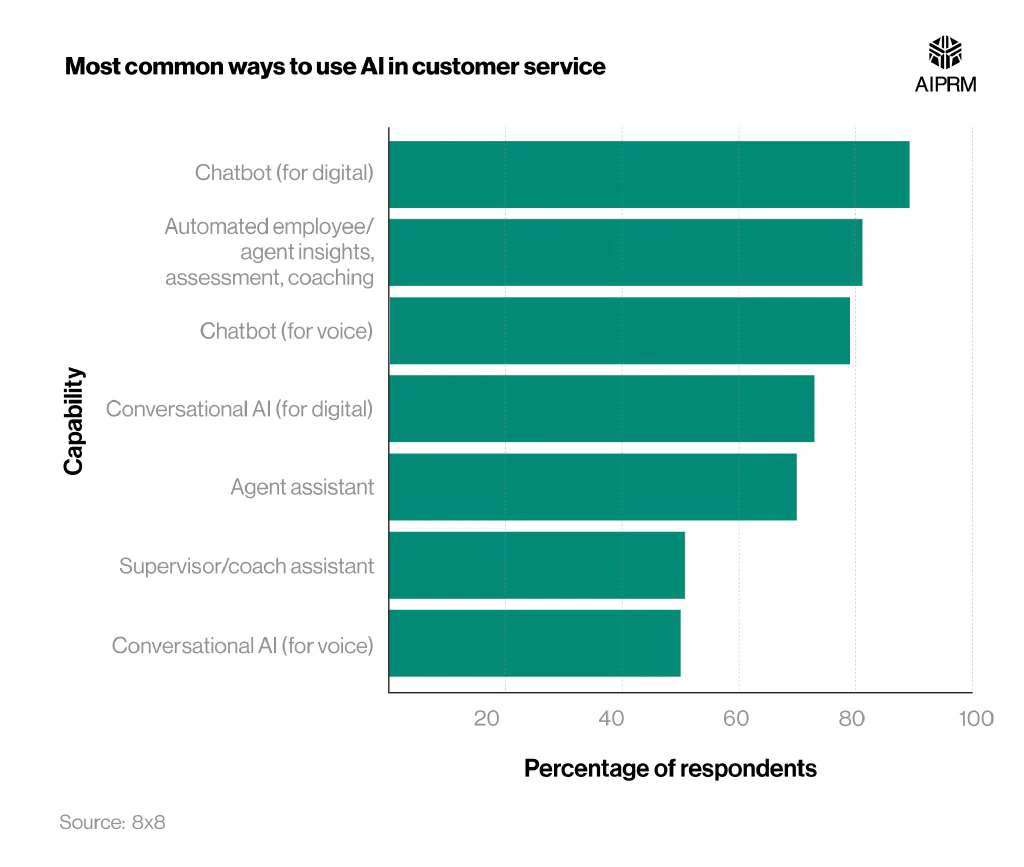
AI is not used in a purely customer-facing capacity, with four-fifths (81%) of centers using the technology to help train staff and provide insights into team performance.
Voice chatbots are the third most common use of AI, with nearly four-fifths (79%) of centers using generative AI for this – 10 percentage points less than for the digital counterpart.
Chatbot statistics #
A survey report from the marketing platform Uberall found that consumers react positively to being served by a chatbot, but that these services are not perfect.
Four-fifths (80%) of surveyed consumers stated that their experience with chatbots has been generally positive. This includes 14% of customers who dubbed their interaction “very positive”.
Despite these successful experiences, consumers still recognise that chatbots have key areas of improvement if they are to compete with human agents.
More than two-fifths (43%) of customers argue that chatbots’ accuracy in appropriately identifying customers’ problems needs to improve. This difficulty in the natural language processing (NLP) element of AI also leads to issues in the flow of conversation, with almost a fifth (19%) of consumers stating that companies need to improve on their chatbots’ ability to hold a natural, human-like conversation.
Benefits of AI in customer service #
Many of the top benefits of AI in customer service reported by support teams are related to time. The most commonly observed advantage of AI is its ability to offer customers 24/7 availability, with half of respondents identifying this.
A breakdown of the top benefits support teams see from using AI #
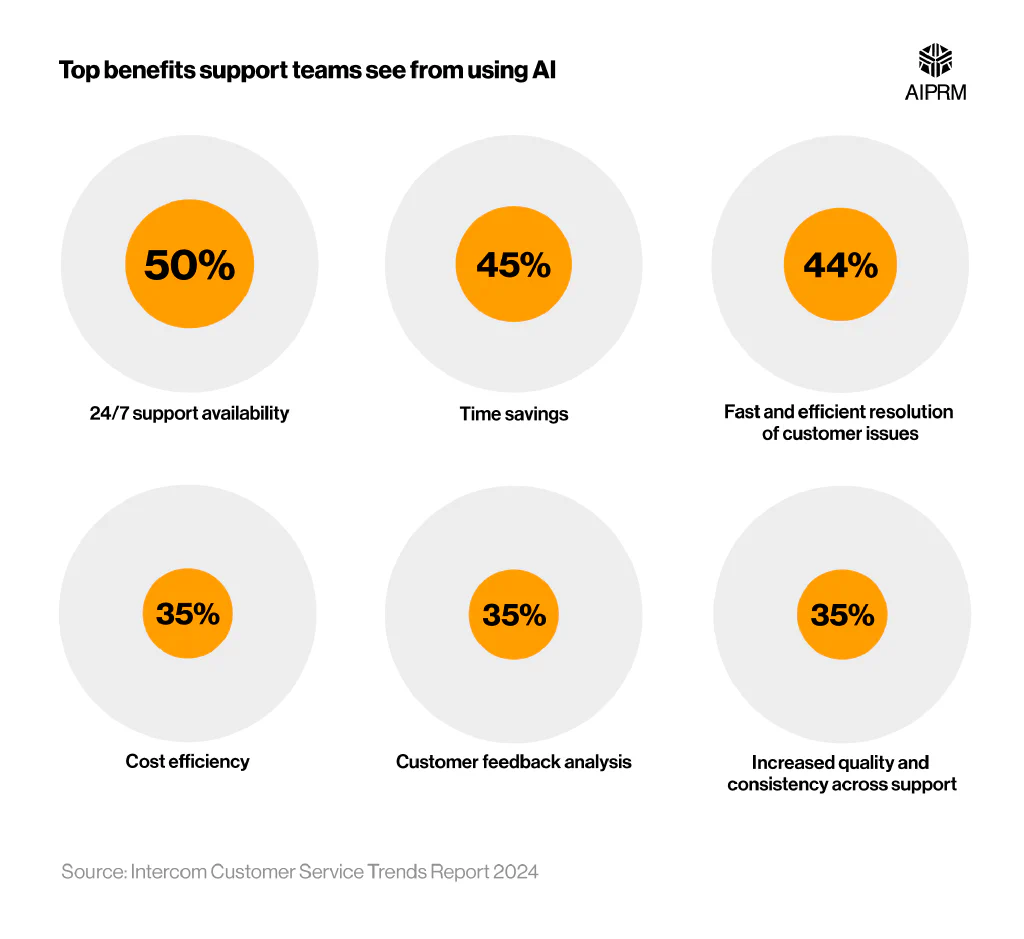
Moreover, 45% of support teams identify AI’s ability to save both customers and agents time as one of the biggest benefits of integrating it into their work. Slightly behind this, 44% highlight the speed and efficiency of problem resolution.
AI presents benefits for the teams themselves too, with just over a third (35%) highlighting the cost savings and ability to analyze customer feedback. Introducing AI also allows for consistency across the board, with AI able to match the processes of human agents.
Concerns and challenges of AI use in customer service #
The greatest challenges surrounding implementing AI into customer service are related to the data available in creating these AI solutions, with more than three-quarters (77%) citing this as a barrier to uptake.
A breakdown of the key obstacles to efficient AI technology implementation #
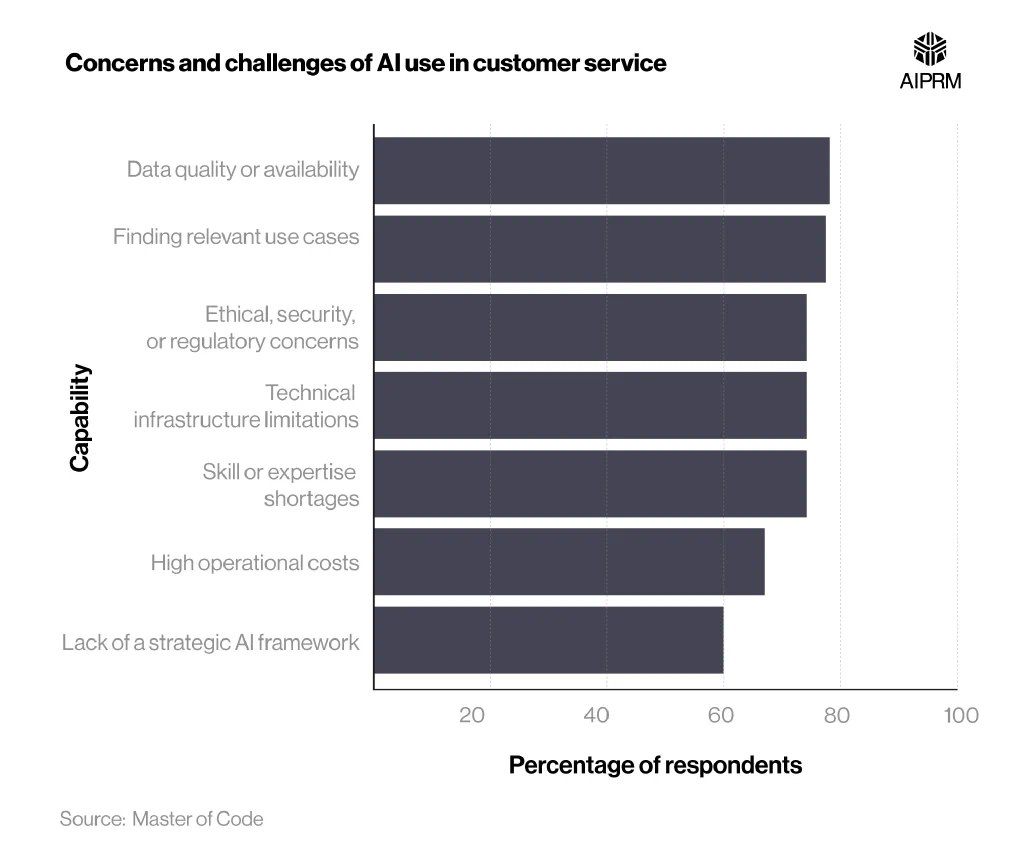
A key issue for customer service teams is the inability to identify relevant use cases in their specific circumstances, with more than three-quarters (76%) stating this is a challenge to adoption.
Companies are also concerned about the ethicality and security around using AI in their business (73%).
Customer attitudes towards the use of AI in customer service #
SurveyMonkey’s Curiosity at Work survey found that, among customer service users, there is an overwhelming belief that AI cannot fully replace human agents in delivering support.
Will AI replace customer service? #
AI in customer service statistics indicate that, while AI offers customers many advantages, such as better availability (41%) and speedier resolutions (37%), a staggering nine in ten (90%) users prefer to receive assistance from a human rather than a chatbot.
The Net Promoter Score (NPS) is a metric used in customer service programmes to rate the overall value of an experience. SurveyMonkey reports that the average NPS is 72 points higher for human service agents than it is for chatbots. Sentiments that go into this score include humans understanding needs better than AI (61%), and humans providing more thorough explanations of issues (53%).
It is important to note that younger generations are more optimistic about the use of AI in customer service, with only around two-fifths (41%) of those under 34 recording negative feelings around AI in CX, compared to nearly three-quarters (72%) of those 65 and over.
How familiar are customers with AI in customer service? #
Despite generally positive feelings about the use of AI in customer service, SurveyMonkey found that consumers typically are not confident in identifying when they are not speaking to a human agent.
Less than a fifth (18%) of consumers feel very confident in their ability to tell when they are speaking to a chatbot, while just 14% are very confident that they can identify AI-generated content. Moreover, less than half (48%) feel sure that they are able to identify any AI-generated content.
Use cases of AI in customer service #
Companies in the retail and consumer packaged goods (CPG) industry are the most concerned with improving customer experience through AI adoption, with nearly four-fifths (79%) stating the importance of CX.
A breakdown of the percentage of companies across retail, communications, and healthcare who are prioritizing customer experience in their AI implementation #
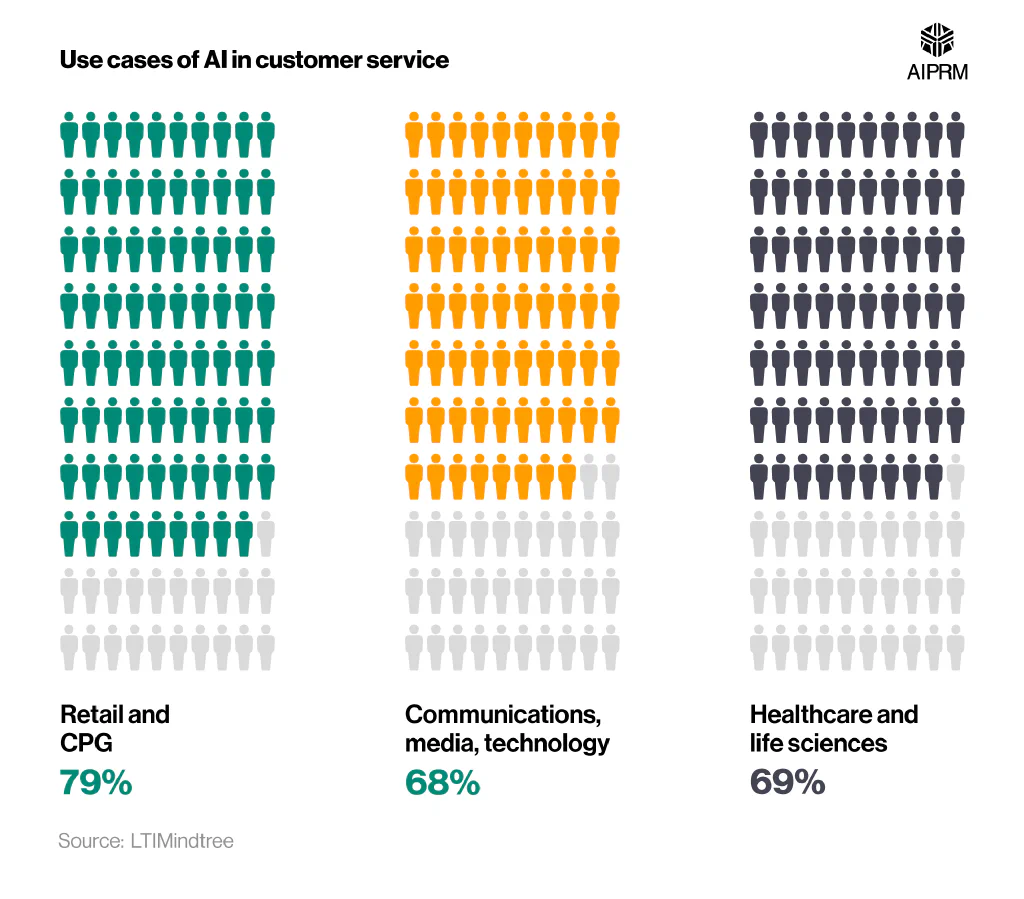
The communications and healthcare industries are similarly occupied with the prioritization of their customer when implementing AI, at 68% and 69% of companies, respectively.
Use of AI in retail customer service #
Customer service in the retail industry is an obvious target for generative AI, with the ability to fire rapid responses to commonly asked questions around deliveries and returns.
Retailers are confident that customers will welcome the move to AI assistants, with nearly four-fifths (78%) agreeing that consumers would accept being served by AI-related technology. Less than a tenth (9%) disagreed, while 6% strongly agreed or felt neutral on the issue.
A breakdown of retailers’ attitudes on customers’ accepting of AI-based service #
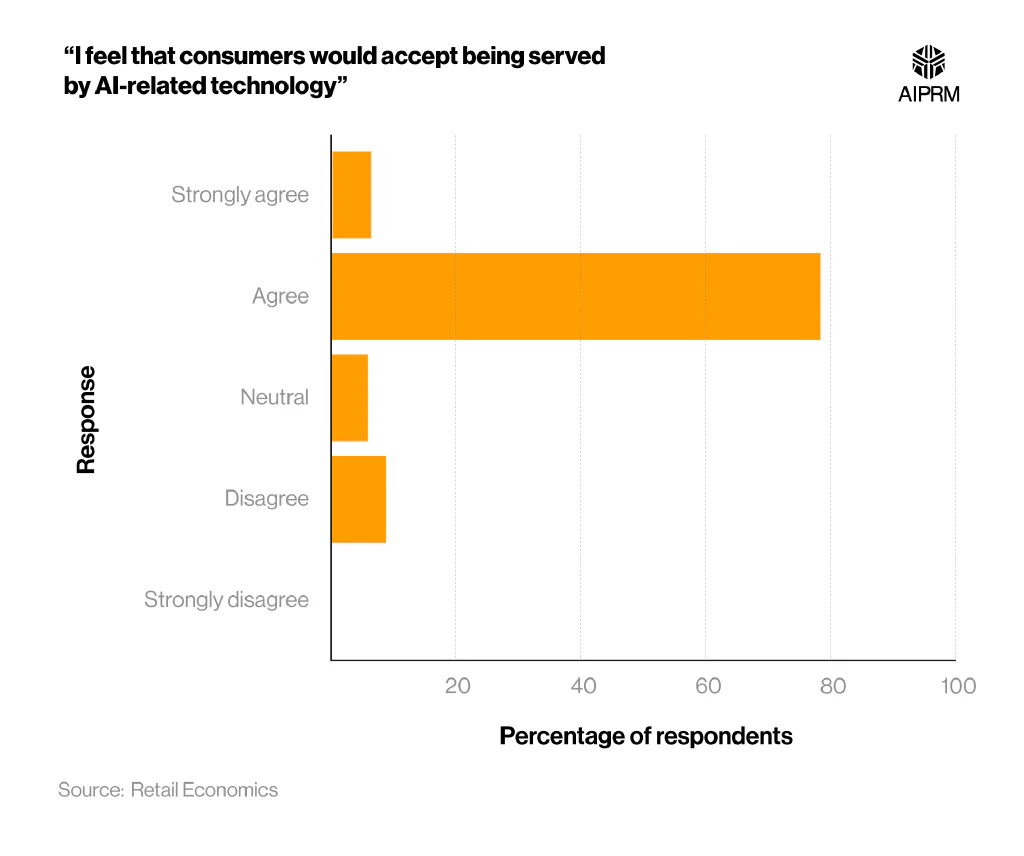
Klarna, a financial services company for the e-commerce industry, announced its AI assistant (powered by OpenAI) in early 2024. The company stated its primary hopes for the new virtual assistant were multilingual support, managing refunds, and fostering healthy financial habits.
Within the first month, Klarna reported that the AI assistant had held 2.3 million customer conversations, representing two-thirds of their total customer service interactions. This is equivalent to the work of 700 full-time human agents.
As well as receiving similar customer satisfaction scores as Klarna’s agents, the AI system led to a 25% drop in repeat enquiries, indicating greater accuracy in problem resolution. Moreover, the reduction in average interaction time has been substantial, with customers resolving their issues in just two minutes, compared to 11 previously.
Klarna predicts that the AI assistant will drive a $40 million profit improvement over 2024.
Use of AI in healthcare customer service #
In February 2024, the Missouri Independent revealed that calls to the state’s general line, which provides information on Medicaid, were being placed on hold for an hour and 45 minutes, on average. Cases like this highlight the need for an improved customer experience in the healthcare sector.
EliseAI is a company which deploys conversational AI technology to update the patient experience, from virtual waitlist management, to facilitating prior authorization for prescriptions. The company claims that the system can handle 95% of patient inquiries, while eliminating hold times.
The company claims that the technology is also beneficial to healthcare workers, suggesting that it can help reduce staff burnout by lightening the administrative load by two to three hours per employee. Further, recent data on AI in healthcare found that nearly nine in 10 (89%) healthcare AI users ‘totally’ or ‘somewhat’ believe AI will speed up processes.
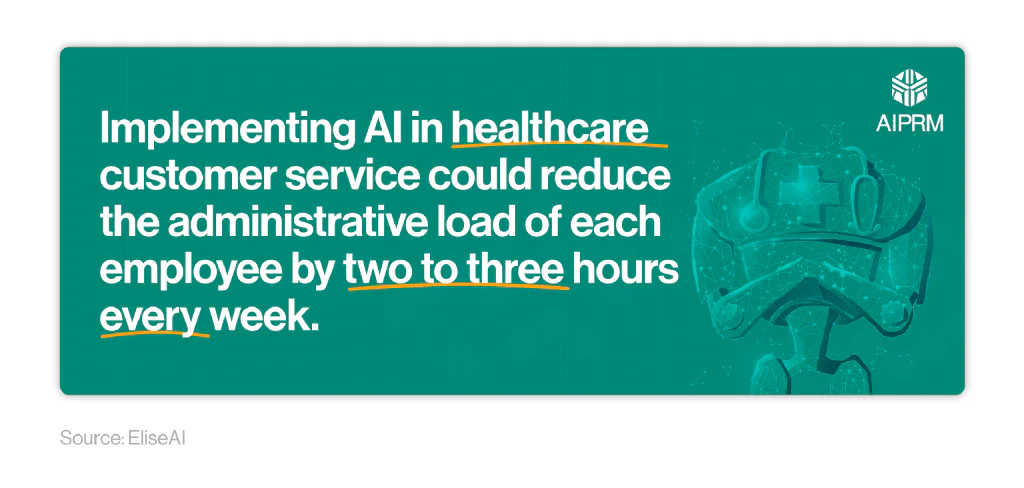
Use of AI in telecommunications customer service #
Software company Nvidia reports that, in the telecommunications industry, AI went from a position of relative obscurity to a key solution in one year (2022-2023). More than two-fifths (43%) of industry professionals surveyed reported that they were investing in generative AI.
More than half (53%) of those surveyed agreed that adopting this technology would give their telecommunications business a competitive advantage, while nearly three-fifths (56%) expect AI to contribute to their success.
The biggest use-case identified by telecommunications professionals is investing in customer experience (49%), with security (42%) and predictive network maintenance (37%) also ranking highly in industry expectations.
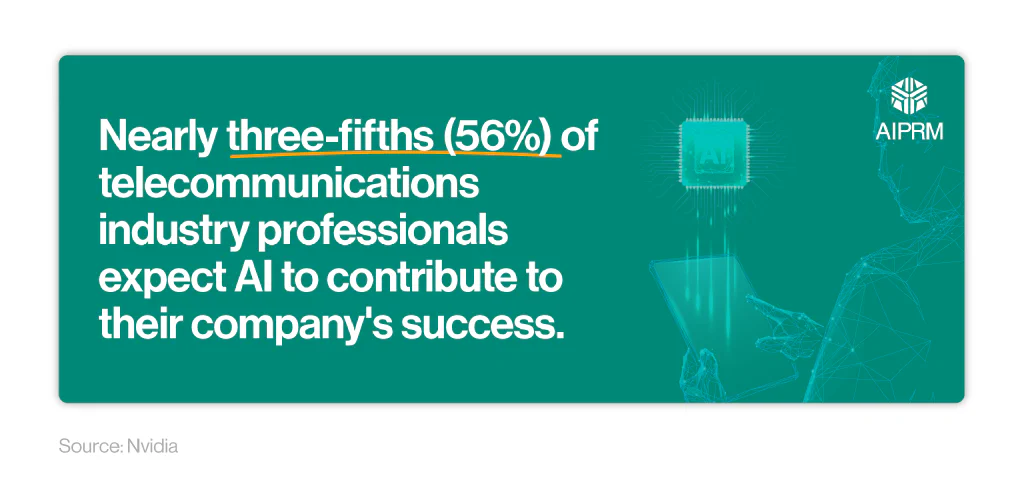
Future of AI use in customer service #
Gartner, a managing consultancy company, predicts that capitalizing on conversational AI could reduce call center agent labor costs by $80 billion in 2026.
Customer experience leaders are typically more optimistic about the future potential of AI in the sector, with four-fifths (80%) expecting predictive customer service to become the norm, compared to just over three-fifths (62%) of CX agents.
A breakdown of customer experience leaders’ and agents’ thoughts on the future of AI in customer service #
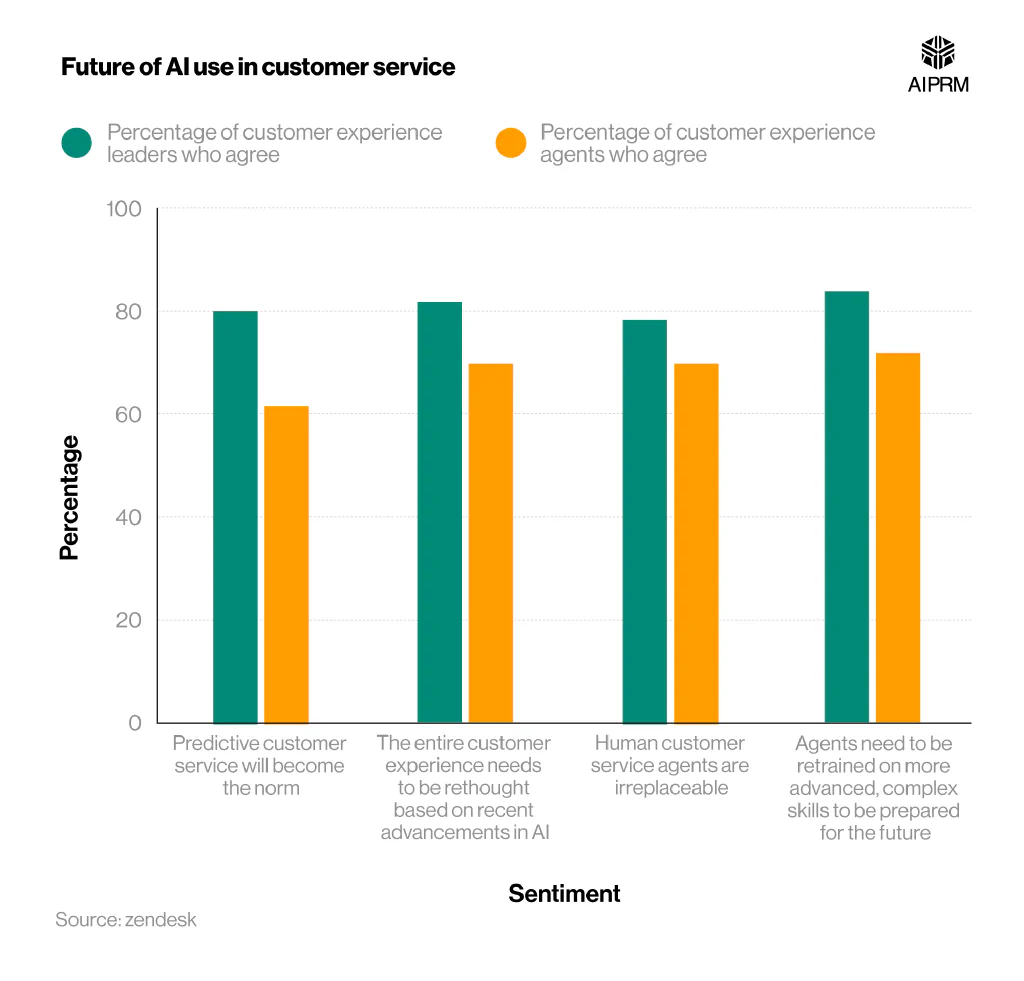
Despite CX leaders being more likely to predict the dominance of AI in customer service, they nevertheless are more likely to agree that the work of human agents cannot be fully replicated. Nearly four-fifths (78%) of leaders believe that human customer service agents are irreplaceable, compared to 69% of agents, indicating a level of anxiety about job security within the industry.
When looking to the future, CX leaders overwhelmingly agree (84%) that agents, though irreplaceable, need to be retrained in order to meet the more complex skills required when working with AI.
This is in line with wider expectations in employment, that employees will not be wholly replaced by new technology, but that they need to adapt to work alongside AI. Recent AI replacing job statistics show that more than four-fifths (83%) of business leaders report that demonstrating AI skills will help current employees maintain job security.
FAQs #
How to use AI in customer service
The most widespread use of AI in customer service is through chatbot interfaces, with nearly nine in ten (89%) contact centers reporting that they use AI to develop digital chatbots. Similarly, voice chatbots are utilized by almost four-fifths (79%) of customer service centers.
How can AI help customer service?
The top benefit teams report from using AI in customer service is the ability to offer 24/7, round-the-clock support (50% of respondents).
In a similar vein, AI’s ability to save time is also a top asset reported by customers and agents. Clothing company H&M reported that their generative AI chatbot had reduced response times by 70% compared to human agents.
What companies use AI for customer service?
Many companies are adopting AI into their customer service processes. Klarna, the financial services company, announced its AI assistant service in January 2024. Within one month, the AI chatbot had covered two-thirds of Klarna’s customer service conversations.
Other examples of companies capitalizing on AI’s ability to streamline interactions are Delta Airlines, H&M, and Zoom.
How does AI perform in customer service?
Klarna’s analysis of the performance of its new AI assistant found that AI scored similarly to human agents in customer satisfaction surveys, and that it was able to reduce repeat enquiries by a quarter (25%). The AI assistant was also able to reduce the average resolution time to just two minutes, compared to 11 previously. The data so far suggests that AI can perform well in customer service roles and processes.
How does AI in customer service help sales?
With almost three in four (73%) customers indicating that they will switch to a competitor following multiple bad experiences with a business, AI offers companies the ability to increase the quality of their support, and, in turn, retain customers for future sales.
Glossary #
Chatbot #
Chatbots are computer programmes which simulate conversations with human users. In customer service, these chatbots are typically used to cover the initial stages of conversation, helping to identify the correct agent to direct the customer to.
CX #
Short for customer experience, this covers all the processes that go into how a business engages with its customers.
Generative AI #
This is a deep-learning model whereby AI is trained on large datasets in order to create text, images, and other content.
Natural Language Processing (NLP) #
NLP is an area of AI which uses machine learning to train computers to understand and reciprocate human language.
Sources #
https://www.zendesk.co.uk/blog/why-companies-should-invest-in-the-customer-experience/
https://www.zendesk.co.uk/blog/ai-call-center/
https://www.futuremarketinsights.com/reports/call-center-ai-market
https://www.intercom.com/campaign/customer-service-trends-2024
https://www.8x8.com/docs/state-of-conversational-ai
https://blog.hubspot.com/marketing/state-of-ai-report
https://masterofcode.com/blog/ai-in-customer-service-statistics
https://www.ltimindtree.info/gen-ai
https://www.klarna.com/international/press/klarna-ai-assistant-handles-two-thirds-of-customer-service-chats-in-its-first-month/ https://missouriindependent.com/2024/02/14/records-show-call-center-wait-times-for-missouri-medicaid-food-assistance-on-the-rise
https://builtin.com/artificial-intelligence/artificial-intelligence-healthcare
https://www.eliseai.com/healthai
https://blogs.nvidia.com/blog/ai-telecommunications-survey/